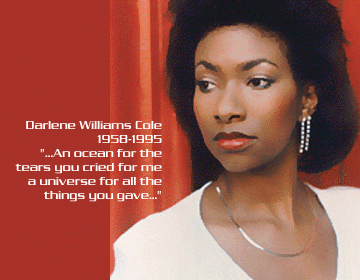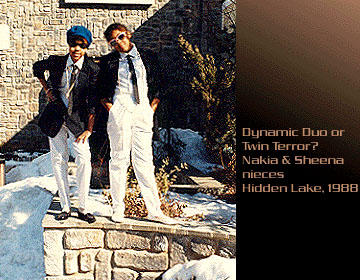
The Real Thing
The truly significant thing about my work with Bonita was how
totally out of my league this woman was. This was a brilliant,
thoughtful, beautiful, tall, light-skinned African American
woman who has savant-like control over an amazing triple-octave
voice she could effortlessly scale from deep contralto to
mezzo-soprano and back again. At some point I simply stopped
worrying about keys because Bonita could adapt at will to
whatever the song was doing. I have not, to this day, met or
engaged anyone with her level of talent, and have bought fairly
few cd's of "professional" artists who are her equal.
Incongruously, Bonita's demo work, presented here, consisted
mainly of cast-offs and hand-me-downs of noisy, poorly-recorded
4-track cassettes I'd first recorded myself, mostly in an effort
to win another woman's heart. The paradox became this: some of
my best and most professional work also features some of the
crappiest recording quality. By the time my little 4-track
empire jumped to the next level, Bonita and I were living very
different and separate lives. I've made two separate
cross-country journeys to search for her without success. I can
only hope that, in this age of Facebook, we will eventually
reconnect. I have absolutely no idea why this woman doesn't
simply own the recording industry. Hers was the whole package:
beauty and amazing talent, limited only, here, by the wretched
condition of the material we had to work with.
The other remarkable thing about working with her is she made me
want to take the work seriously. Before Bonita, I never paid
much attention to my own singing. I just kind of bellowed out
Bruce Springsteen hollers, not worrying overmuch if I was
actually on key or if the singing was any good. I was
embarrassed to sing with her, and actually recorded my solo on
This Time of Year alone, a week after Bonita had laid
down her vocals. Subsequently, I began working harder on my own
singing, hence Pandora's Box, which is essentially a
second stab at Girls, features much-improved moose howls
on my part. Nothing even remotely in Bonita's league, but her
influence and patience with me led to a marked improvement.
I met Bonita Therese Marshal, a skinny, pale looking
22-year old, in an office supply store sometime in 1986. She worked in
the store and I heard
her humming little tunes as she busied herself. She was like
this beautiful stray cat, an object of under-appreciation and
neglect. "High yella" and fine, I thought about
hitting on her before I realized she was wearing a wedding band
and talking on the phone to someone she kept calling, “honey.”
The voice, though, was phenomenal, like nothing I’d ever heard,
so I asked her if she sang and she said she did. I thought I
might use her on some background tracks or something.
In 1985 I’d recorded a cover of Dionne Warwick’s classic
Stop, Look & Listen with Dinky for my young friend Michael
Hammond. This, and Louie, Louie, were the only covers
I’ve ever recorded. I’d been impressed by Luther Vandross’
re-addressing of classic songs. He’d pretty much write an
entirely different groove, imbuing the new effort with deep, R&B
muscle while retaining the familiar melody. Stop, Look...
was my attempt at the Luther Vandross / Nat Adderly, Jr./Marcus
Miller sound, and it achieved at best mixed results.
We never did anything with the track, and it was sitting around
gathering dust when I brought Bonita over to try it out just as
a kind of screen test. Bonita blew me away. I could not believe
someone with that level of control and craft could be working in
an office supply store.
By the way, no one who worked on Stop, Look... had ever
heard the original. Bonita assumed I’d written it. Neither Dinky
nor Michael had ever heard the song before.

I dug out several other old sore demos, stuff I’d written about
Darlene, a woman I’d desperately loved but wasn’t speaking to
(long story).
That Says Love To Me was written around ’81 as a little
ditty to Darlene. I'd embarrass her by playing it on piano at
bars. This is one of my best songs, with this great
bridge that subtly modulates the key, and Nita's amazing,
transparent purity.
This
Time of Year, was written about Darlene; about missing her
voice, her friendship, her company. I recorded it once
or twice before in crude attempts at the home studio thing.
Bonita ate it up, breathing new life into the song. By 1986, Darlene and I were speaking again, though we
were never involved again. I borrowed a book of Darlene’s
poetry, where I found the lyrics to
Fool In Love With You, a poem I believe was written about
our situation from ’81 (long story). Fool ... was the
first new tracks I recorded specifically for Bonita, and she
hated the song. Well, maybe not hated, but she didn’t care for
it.
This made for an awkward moment when Bonita connected with
Darlene by phone. They got along instantly, thick as thieves,
but Bonita felt obligated to tell Darlene she didn't care for
Fool... mainly because she didn't like referring to herself
as a fool. The refrain Fool In Love With You was my invention,
not Darlene's, and I was happy to take the blame for it. Always
the professional, however, Bonita sang the devil out of that
song. If she hated it, she didn't let it show in the work.
We spent several days working on Fool..., ruining the
complex, layered background vocals one afternoon when I hit the
wrong button. Fwoosh! Eight hours of work up in smoke.
After which Bonita went home and got assaulted by her husband,
who, moron that he was, assumed it only took three minutes to
record a three-minute song, so Bonita and I must have been
fooling around. This guy was a monkey of epic proportions.
Bonita and I were as close as sister and brother, and that was
the nature and extent of that relationship. Trooper that she
was, she continued to make her sessions as we continued
compiling her work.
By 1988 I was deeply infatuated with Yanick, but keeping a
reasonable distance.
First True Love sprang from Yanick lamenting her boyfriends’
emotional inexperience. I turned to her and said, “Hey- there’s
a song in that idea,” and went home to record the
Motown-inspired First True... My reading was awful, and I
later gave it to Bonita who set the world on fire with it.
It's
Alright, my single foray into Go-Go, sprang out of another story Yanick told me, this
time about running into an ex and not being intimidated by him.
It was a good fit with Bonita’s turbulent love life. Yanick's
bassist, Derek Jackson, laid a monster Go-Go bass line on
this track for me— I mean, I was literally cringing behind the
board while he melted the paint off the walls— but, regrettably,
that master is lost to posterity, so we're stuck with my lame
bass playing.
Once Yanick became available, I wrote
You’re All I Need, an overlong syrupy plea with a
disastrously stupid monologue. I mailed it to her but she never
got to the post office to pick it up, and the package was
returned to me unopened.
 In Bonita’s hands, though, You’re All I Need became a
lightning rod. Things that sounded ridiculous and pathetic when
I sang them sounded searing and urgent in her reading. The song
sprang to life and suddenly had dimension and meaning and power.
The only problem was Bonita’s speaking voice was, uh, rather
duck-like. She couldn’t do a convincing monologue, so I
recruited Tuesday L’Anette Cooper, a college girl I’d met in
Rutgers University Bookstore, to do the voiceover. It took hours
to get her in the right zone, which she ultimately accomplished
by turning off every light in the room except a pen light over
the script, and kind of lying on her side to get into a
lounge-like state.
In Bonita’s hands, though, You’re All I Need became a
lightning rod. Things that sounded ridiculous and pathetic when
I sang them sounded searing and urgent in her reading. The song
sprang to life and suddenly had dimension and meaning and power.
The only problem was Bonita’s speaking voice was, uh, rather
duck-like. She couldn’t do a convincing monologue, so I
recruited Tuesday L’Anette Cooper, a college girl I’d met in
Rutgers University Bookstore, to do the voiceover. It took hours
to get her in the right zone, which she ultimately accomplished
by turning off every light in the room except a pen light over
the script, and kind of lying on her side to get into a
lounge-like state.
During one of Bonita’s particularly down periods, a sick,
emaciated, pregnant Bonita (who later lost the baby) made
friends with my nieces, Nakia (NeeNee) Wells (13) and Sheena
Owsley (11). It was love at first sight for the three of them.
To cheer Bonita up, the girls decided to make a tape of
That Says Love To Me (Kids Mix). I coaxed two very skittish
preteens through a nervous reading of the song, and then chased
them around the studio with a water pistol to get them to giggle
and scream properly. We also dubbed in a series of toasts to
NeeNee’s cats and to “No Boyfriends.”
By now Yanick was in my life, and Bonita was anxious about Yanick because she felt that I would concentrate
all of my energy and time on Yanick and not on her. I don’t
think Bonita realized she herself was the reason I stepped back
from her, that Yanick had nothing to do with it. For her part,
Yanick was extremely intimidated by Bonita’s powers and couldn’t
stand listening to her demos. Bonita, pregnant with twins (who
both arrived safely), tried to make friends with Yanick, but it
never really took. These two lunatics, intimidated by each other
for completely different reasons, did The Eggshell Dance Of
Extreme Politeness, but that was about as far as the
relationship went.
Christopher J. Priest
January 2000 UPDATED OCTOBER 2013
Home | Blog | Projects | Comics | Rants | Music | Video | Christian Site | Contact
Unless otherwise specified, Copyright © 2013 Lamercie Park. All Rights Reserved.
TOP OF PAGE




